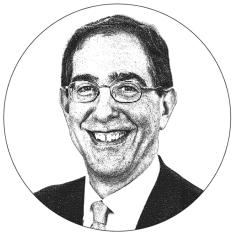The media landscape today is filled with commentary decrying the state of free expression on college campuses. I want to tell you about a recent episode that, in my view, better represents the quality of campus discussion at Princeton today. The faculty committee that oversees an endowed lecture named for literary critic and Palestinian advocate Edward Said ’57 invited Mohammed El-Kurd to deliver this year’s address, exploring the notion of “perfect victims” and expanding on Said’s question as to who has “permission to narrate.”
El-Kurd, a Palestinian poet and journalist who is harshly critical of Israel, is no stranger to campus dustups. His appearance at Harvard last fall drew demonstrators, and an event featuring him last year at American University was moved off campus.
News of El-Kurd’s invitation to Princeton broke on Twitter and, predictably, erupted there into attempts by external groups to stoke outrage. What happened instead is a case study in civil discourse.
In the run-up to the Feb. 8 lecture, there was an exchange of letters that played out partly in the pages of the Daily Princetonian. Because the English department cosponsors the Said lecture, its acting chair, Professor Jeff Dolven, received letters from one of Princeton’s rabbis, student Jewish leaders, and a group of 41 undergraduates.
These letters expressed anguish, disappointment, and fear over the choice of El-Kurd. They called on the department to condemn him and some of his writings, which they regard as antisemitic. “I respectfully ask you to consider whether such rhetoric would be tolerated if it targeted other groups,” wrote Rabbi Gil Steinlauf ’91, executive director at the Center for Jewish Life, in a message copied to several administrators.
Without exception, however, the letters also expressed support for El-Kurd’s right to be invited and heard, some citing by chapter and section the part of Princeton’s Rights, Rules, Responsibilities that “guarantees all members of the University community the broadest possible latitude to speak, write, listen, challenge, and learn.”
“In the name of free speech, we are not demanding that the Department of English retract its sponsorship,” wrote the 41 undergrads. “Instead, we write today with urgency to request that the department condemn the event.”
Dolven, a Princeton professor for more than 20 years, took that as an opportunity to teach. Here’s an excerpt from his response:
[Our Department has] always granted great autonomy to faculty in making invitations. Departmental sponsorship is not an endorsement of what a speaker has said or might say—as you can imagine, such a requirement would dramatically restrict the range of voices that could be heard on campus. This openness also means that theDepartment as a whole does not make statements. It is an important principle for us that we leave that speech to individuals and voluntary groups, and that neither I nor anyone else attempts to speak for a diverse collective. I can say of all my colleagues, with personal confidence, that we share a deep concern with the rise of antisemitic violence and speech locally, nationally, and globally.
A campus debate about a controversial speaker thus expanded into one about departmental statements, which I discussed in my November PAW column, and which is the subject of an ongoing faculty policy review. It was an intellectually rigorous and rich exchange, at times passionately argued, at all times civil.
Meanwhile, as Twitter and Facebook raged intemperately in the background, the Princeton conversation expanded into the alumni ranks. Dean of the College Jill Dolan received a letter from a Princeton alumnus and parent asking why the English department would sponsor an “appalling” speaker.
Dolan, who is also a Jewish member of the English faculty, replied, “The English Department sponsored El-Kurd’s speech because a committee invited him to give this year’s Edward Said Lecture. We don’t intervene in the academic freedom of our faculty.” The exchange could have ended there, but Dolan continued:
I do realize that offensive speech, from wherever it comes, is painful to hear, especially when it degrades and vilifies the communities to which one belongs. In those cases (and there have been several on campus this year), I try to reach out with empathy to those who are pained. I also encourage them to speak back, to mount counter-discourses, to claim their agency and their full subjectivity.
The 2023 Edward W. Said Memorial Lecture went on without incident, in a packed McCosh Hall lecture room containing about 300 people. People listened, they asked tough questions, and they made their own judgments about what to think.
A day later, someone who had heard about the event only from social media and Fox News asked me: “How can we get civil discourse back on college campuses?”
We have civil discourse on this campus. I believe we have it on most American college campuses. There are very few places right now in America where you can have the exchanges that I just described between people who disagree so strongly and are still capable of working together. We should be proud of that, and we should push back hard against the distorted accounts of those who say otherwise.

